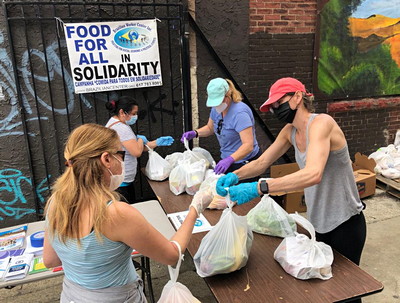Community Survey: The Impact of COVID-19 on Immigrants in Mass.

Since the start of the COVID-19 pandemic, it has been clear that immigrants in Massachusetts have been disproportionately affected – both by illness, and by job losses and economic distress. Except for limited public health data, however, we had little empirical evidence to quantify the impact across the Commonwealth. In July 2020, MIRA launched a community survey, in partnership with several of its member organizations, aiming to provide those much-needed numbers.
We got 433 responses from immigrant households across Massachusetts; 37% included at least one undocumented member, and 62% included at least one U.S. citizen.
Full survey report • Slide deck • Webinar
- 76.4% experienced at least one job loss in their household – most commonly a temporary shutdown or staff reduction, though months later, many are still jobless or on reduced hours. 83.9% of households with undocumented members had a job loss.
- 3 in 5 households said at least one person who lost a job or had hours cut back did not collect unemployment benefits; among households with undocumented members, it was 82%. The main reason cited was ineligibility due to immigration status.
- Only 29.8% said they had received federal stimulus payments ($1,200 per taxpayer and $500 per dependent child) for everyone in the household; 23.3% got them for only some members, and 33.5% got nothing due to a household member’s immigration status.
- Of the 91 households (21%) who reported at least one person with COVID-19-like symptoms, only 30.8% said the whole household got tested and professionally treated; 27.5% said only some were tested, and 41.8% said no one was tested, and they just took care of the sick at home.
- 2 in 5 respondents overall, and 3 in 5 in households with undocumented members, reported some form of housing insecurity, most commonly due to missed rent payments.
- 59.3% of respondents reported food insecurity or listed at least one source of food or cash assistance (public programs or private charity) they have relied on; in households with undocumented members, the share is 77.8%.
The data show how urgently we need another federal stimulus – but this time we need it to benefit all families. The HEROES Act passed by the U.S. House of Representatives in May was a good start. As the Senate now works on a potential bipartisan compromise, our message to Senators is: Don’t negotiate immigrants out of yet another deal. It’s a matter of justice.
We also have several recommendations for Massachusetts, including further investments in the Residential Assistance for Families in Transition (RAFT) program, which got a $20 million boost in the fiscal 2020 supplemental budget; additional support for community organizations to provide food and cash assistance to families; and passage of four key bills:
- The emergency housing stability bill (H.4878 and S.2831), to extend the eviction moratorium for a year after the COVID-19 Emergency Declaration is rescinded.
- Emergency paid sick time legislation (H.4700 and S.2701), so workers don’t have to choose between taking care of their health or their loved ones, or getting paid.
- The Work and Family Mobility Act (H.3012 and S.2061), to ensure that immigrants can safely travel to find the resources they need during the pandemic.
- The Safe Communities Act (H.3573 and S.1401), to send a strong message that in Massachusetts, immigrants can safely interact with state and local authorities, without fear of being turned over to immigration agents.
We also urge state agencies to significantly step up efforts to ensure language access for Massachusetts’ diverse immigrant communities – we have nearly 600,000 limited-English-proficient residents who speak dozens of different languages – and invest in targeted outreach to ensure that immigrants know how to access crucial safety-net programs.
